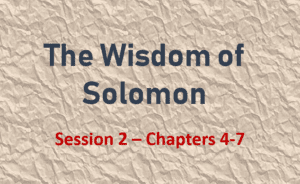
Chapters 4 – 7
Wisdom Literature – Contrasts – Introducing Wisdom
Wisdom literature was quite common in the ancient Near East. It generally deals with questions of value, moral behavior, the meaning of human life, and the proper conduct of life. The perspective is often international and sometimes universalist. That is, it generally does not apply to just one nation or group of people. Laws are universal laws, not just those of a single nation-state. There is, for example, little in the three major wisdom books of the Old Testament (Job, Proverbs, and Ecclesiastes) that is specifically Israelite.
The structure of wisdom writings may vary. The style and content of the three major wisdom books in the Old Testament are quite different. Job begins and ends with a narrative, but the bulk the book is a series of poetic speeches. The characters are monotheists, though not necessarily Israelites, but “dwellers of the East”. The Book of Proverbs is thoroughly pragmatic, and consists of a series of sayings or advice. Ecclesiastes (or Qohelet) consists of a series of reflections on the nature of reality and the human condition, but into which no national considerations enter.
Some of the Psalms are considered wisdom literature. Song of Songs (or Song of Solomon) is also sometimes included as wisdom literature. In the Apocrypha, the Wisdom of Solomon and Ecclesiasticus (or Sirach) are considered wisdom literature.
As we continue with the Wisdom of Solomon, we find a lot of repetition in contrasting the righteous and the unrighteous (wicked). There are direct parallels in the third contrast (Wisdom 4:1-6 with Wisdom 3:13-19) as the writer discusses offspring of the righteous and of the wicked. The fourth contrast (Wisdom 4:7–20) parallels Wisdom 31–9, where the theme is suffering and death. Verse one of chapter four tells us that the virtuous find immortality in the memory of God and mortals, but verse nineteen counters that the memory of the wicked will perish. The author also uses an idea parallel with that of Isaiah (Isaiah 57:1–2) to explain that death of young righteous men may actually be reward instead of punishment. The righteous are being carried away to be removed from evil (Wisdom 4:7–9). This, in contrast with the traditional association of old age with wisdom and righteousness.
Chapter five also provides more contrasts and comparisons. It begins with the speech of the unrighteous (Wisdom 5:1–8), who too late have discovered the error of their ways and now find remorse. This is in direct contrast with their arrogance earlier (Wisdom 2:1–20). We are told that the wicked will disappear forever (Wisdom 5:9–14) in contrast to the righteous who will live forever (Wisdom 5:15–23). The Lord will use the strength of the righteous to defeat His enemies.
Chapter six begins with a call to wisdom (Wisdom 6:1–21). Again, we find this parallel to chapter one (Wisdom 1:1–15). The chapter begins with an address to the kings or rulers. This is a common strategy among wisdom writers and philosophers of the ancient period. Plutarch stressed a similar need for rulers to be wise and benevolent. Here the author is not speaking just to Jewish kings, as is common in most of the Old Testament, but to all the rulers of the world. The perception of God here is that of a universal God, not just a Hebrew God that we are familiar with early in the Hebrew bible. The law referred to in verse four is universal law, not Jewish law.
The personified figure of Wisdom appears in this chapter (Wisdom 6:12–16) for the first time and continues through chapter 10. This is the female wisdom or Lady Wisdom we saw in the first chapter. The next few verses (Wisdom 6:17 – 22) provide the motivation for acquiring wisdom, or letting wisdom enter. It is arranged as a sorites – an argument consisting of propositions designed so that the predicate of one becomes the subject of the next. “Desire” to “love” to “keeping her laws” to “immortality”. This ends the introduction or the book of eschatology. The Book of Wisdom (or the Encomium) begins with the last four verses of chapter 6 (Wisdom 6:22-25), where the author promises to reveal the mysteries of wisdom to the reader, and assures us that he will keep nothing back. “The multitude of the wise is the salvation of the world.”
Chapter seven begins with the author introducing himself as a fellow human being, born like others (Wisdom 7:1–14). The description he provides includes praying for wisdom and being given so much more – wealth, power, and long life. The description so closely parallels that of I Kings 3:4–14, that it is clear to the reader that the author must be King Solomon. The author was not only given wealth and power, but an understanding of science and nature. His teacher was Wisdom (Wisdom 7:15–22a).
The author then begins the “encomium”, or praise of Wisdom (Wisdom 7:22b–8:1). The praise starts with all the wonderful things that may describe Wisdom’s relationship with God. She is a reflection of eternal light. God loves nothing so much as the person who lives with Wisdom. Evil never prevails against Wisdom. She is more beautiful than the sun and stars. The encomium will continue on through chapter ten.
Primary Text: The New Oxford Annotated Apocrypha – New Revised Standard Version, (Revised Fourth Edition) Michael D. Coogan, Editor, Oxford University Press, 2010
Other Sources: The Wisdom Books, Job, Proverbs, and Ecclesiastes; A Translation with Commentary, by Robert Alter, W. W. Norton & Company, 2010
Israel’s Wisdom Literature: A Liberation-Critical Reading, by Dianne Bergant, Fortress Press, 1997
Next Week: Chapters 8 –11

 3700 West Northgate Dr.
3700 West Northgate Dr.